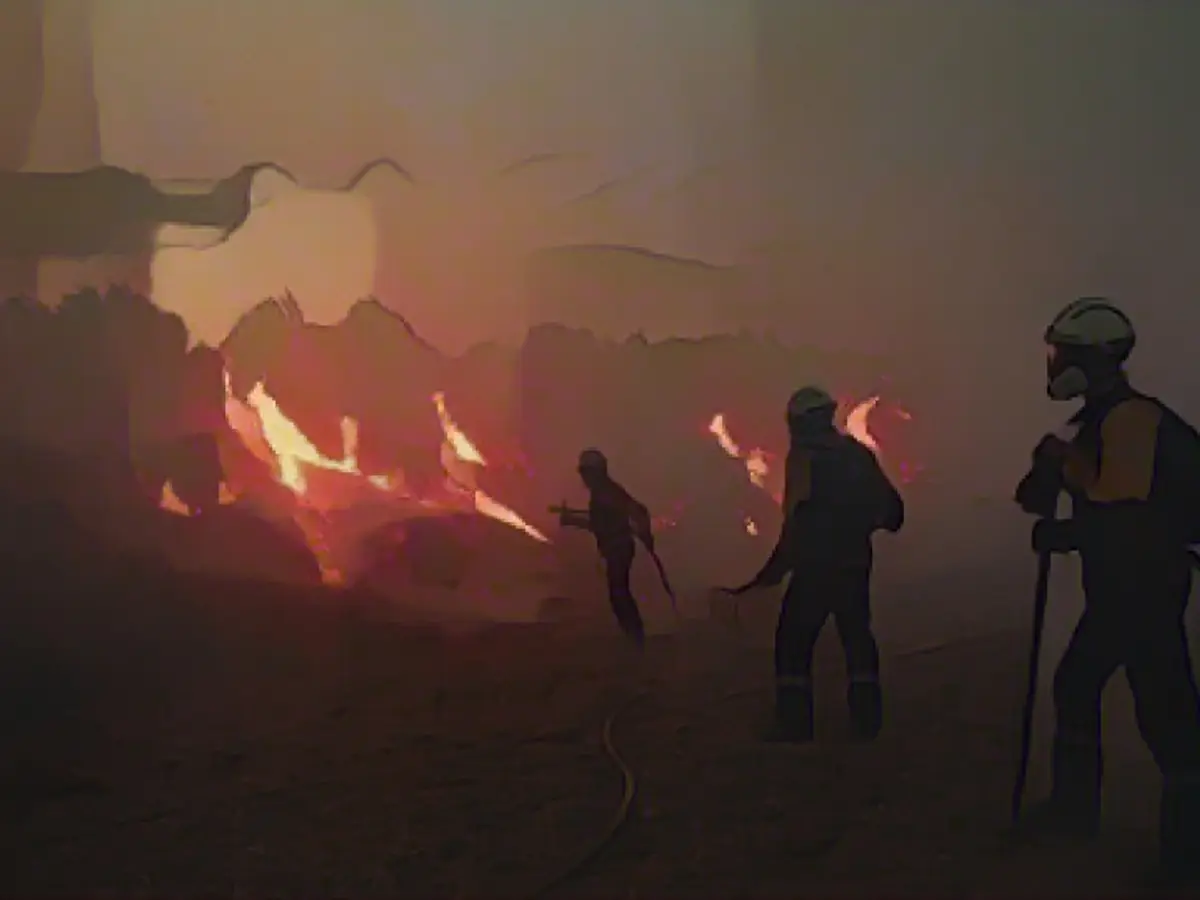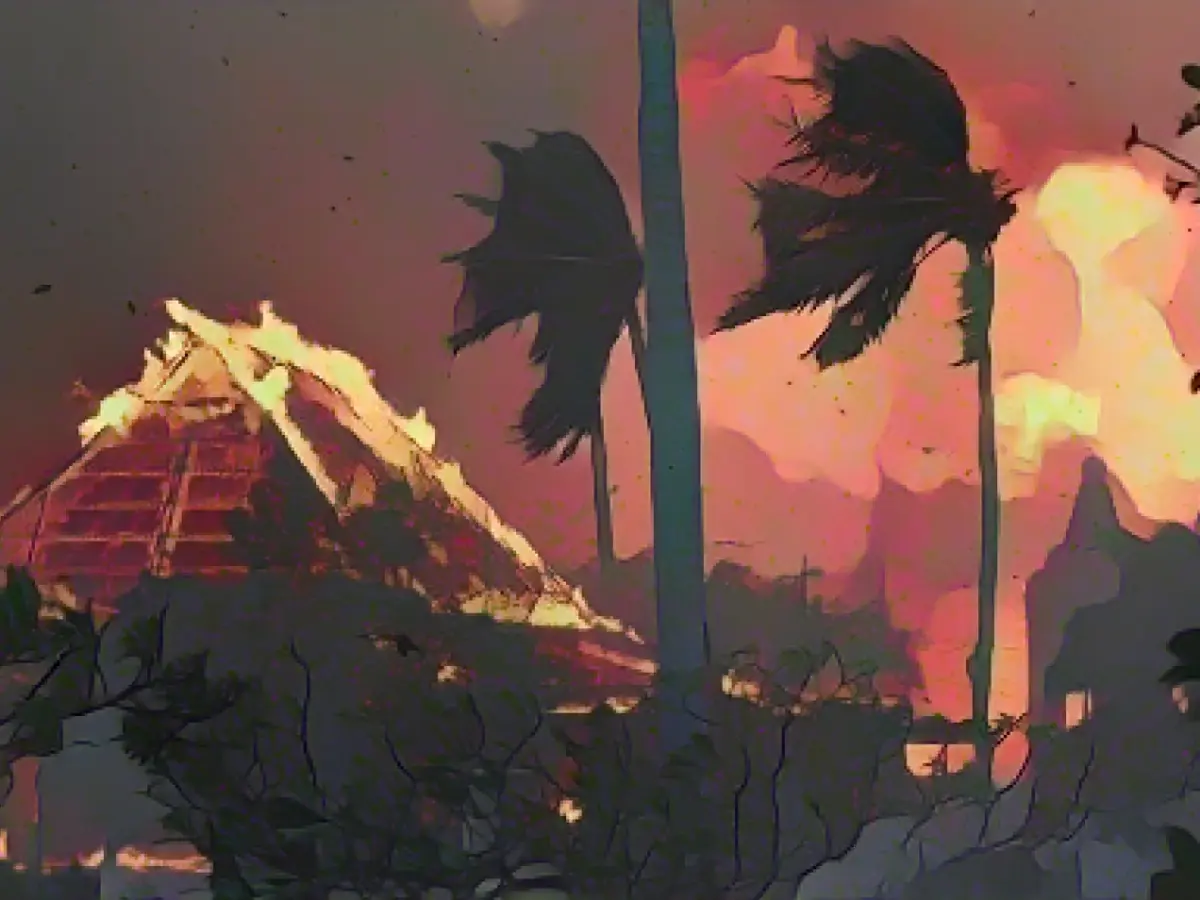Table of contents
- Extreme heat
- Drought
- Forest fires
- Storms
- Heavy rain
- Floods
Year of extremes - Forest fires, tropical storms and floods - what impact did climate change really have in 2023?
The weather had a lot to offer this year: From icy winter and raging tropical storms to extreme heat, drought and forest fires to torrential rain and muddy floods, it was all there. 2023 hasn't even come to an end yet when forecasts and breaking news about heat records over the past twelve months are already coming thick and fast. Researchers agree that the year has surpassed all previous measurements - at least in terms of temperatures. It will not only go down in history as the hottest year on record. It is even said to have been hotter than it has been for 125,000 years.
Only climate scientists are not quite sure exactly what role climate change played in all the extreme weather events. "To say that extreme weather events are becoming more frequent as a result of climate change would not be correct," says the Helmholtz Institute's Climate Initiative website.
Whether man-made climate change was responsible for the devastating forest fires in Greece and Canada or for the severe floods in China, Libya and Eastern Europe? It depends, say attribution researchers such as Ben Clarke from the Grantham Institute for Climate Change and the Environment at Imperial College London, who deal with precisely such questions. Various climate models are used to simulate the weather in different scenarios - once in a hypothetical atmosphere without human influence and under current conditions with increased greenhouse gas content.
What does this mean for the climate year 2023? An overview of the most extreme weather events:
Extreme heat
Never before in the history of weather records has it been as hot as on July 6, 2023: The global average temperature was 17.08 degrees Celsius. The first temperature records were reported by countries in southern Europe in particular; the Italian capital Rome was one of the frontrunners. According to calculations, the summer of 2023 broke all previous temperature records.
This is what science says: This year's heat records would never have been set without anthropogenic climate change, says Ben Clarke, with the weather phenomenon El Niño also playing a role ( read more here). "Our study found that the extreme heatwaves that hit Europe and North America in July have become 2 to 2.5 degrees Celsius hotter due to climate change." According to several scientific studies, central and eastern North America, central and southern Europe, western and central Asia and southern Africa are particularly affected.
Drought
Dry river beds or low water levels in watercourses put the French authorities on alert in spring: no rain for 30 days and the soil was still suffering from last year's drought, they said. In some regions of the country, water-saving measures were imposed before it could even get really hot. In Germany, too, it was far too dry for the time of year. The media wrote of a "winter drought".
This is what science says: The German Weather Service distinguishes between four different types of drought:
- Meteorological drought: one to two months drier than usual.
- Agricultural drought: Drought lasting two months or more with crop losses.
- Hydrological drought: If it is too dry for at least four months, the groundwater is also affected.
- Socio-economic drought: Drought over an entire year, which slows down economic output.
Globally, countries and regions are affected to varying degrees. Droughts occur when there is too little rainfall. Climate change can exacerbate them. "Our studies have shown that prolonged droughts in the Horn of Africa and West Asia have become much more intense due to climate change," says Clarke.
Forest fires
In 2023, there was no continent that was not affected by severe forest fires. In the Canadian province of Québec, the fire in June was so intense that the smoke drifted across the border and covered the US metropolis of New York in an orange haze. In Australia, firefighters battled huge bushfires, while the lower third of Africa was ablaze, as were parts of Asia and Latin America. In Europe, the fire on the Greek island of Rhodes caused a sensation: 20,000 people had to be brought to safety and several nature reserves were destroyed.

What science says: When it comes to forest fires, researchers largely agree that climate change itself does not cause fires. But it does encourage them. Experts speak of "fire weather". Drought, little or no precipitation and high temperatures provide enough fuel. But it is human carelessness or lightning strikes that trigger fires (read more here).
Studies show that the risk of forest fires has increased massively, particularly in the west of the USA and in Canada, the Mediterranean region, Amazonia, South East Asia and Australia. This is due to global warming and drought. According to the World Climate Report, the forest fire season increased by almost 19 percent between 1979 and 2013. By 2050, the frequency of fires is expected to increase by almost 20 percent compared to the turn of the millennium.
Storms
The year got off to a chaotic start in the USA: storms raged across California, Alabama and Nevada, bringing weeks of heavy snow and rain. In some regions, it rained as much in 50 days as it normally does in twelve months. For the first time in decades, the Californian authorities warned of blizzards. The US President had to declare a state of emergency for the states of California and Alabama. At least 15 people died as a result of the storms.
In February, Cyclone Freddy roared across the Indian Ocean and the east coast of Africa. The island of Madagascar and the countries of Malawi and Mozambique were affected. Meteorologists describe "Freddy" as the longest-lasting cyclone ever recorded. It lasted from early February to mid-March and claimed more than 1400 lives.
According to climate researcher Clarke, winter storms and hurricanes could occur less frequently due to global warming, but could be more severe. The link between climate change and storms is particularly well documented for the North Atlantic: "Due to climate change, strong hurricanes such as Katrina in 2005 and Maria in 2017 are expected to increase not only with increased precipitation, but also with more extreme wind speeds," says the scientist.
According to a study in the specialist journal "Pnas", hurricanes with a force of three to five increased fivefold between 1979 and 2017. At the same time, they have lost speed within 60 years, meaning they are becoming slower.
In contrast, there is hardly any reliable knowledge for the tropical regions due to a lack of weather data. However, researchers are observing that the paths of tropical storms in the western Pacific are shifting northwards, "which can lead to extreme conditions in areas where this was not the case in the past", explains Clarke.
Heavy rain
In August, heavy rainfall washed away parts of Austria and Slovenia. The situation in Libya was particularly bad: two dams in the African country were unable to withstand the masses of water. The floods poured towards the coastal town of Darna. More than 5000 people died. The catastrophe was triggered by storm Daniel in the eastern Mediterranean. Greece, Turkey and Bulgaria were also affected. The Libyan government spoke of the heaviest rainfall in 40 years.
What science says: The role of climate change in extreme wet events has not yet been conclusively clarified. According to meteorologists and climate scientists, more data is needed. However, according to climate researcher Clarke, it is clear that rainfall becomes more intense due to higher temperatures "because a warmer atmosphere can absorb more water". Climate change could therefore have increased the extent of rainfall in Eastern Europe, for example.
Floods
Extreme heat and drought were followed by severe flooding in China. Thousands of people from several provinces had to be evacuated. The capital Beijing was also affected.
This is what the science says: "Heavy rainfall is often the main cause of flooding, but human factors such as land use and infrastructure can exacerbate it," explains climate researcher Clarke. According to scientists, some floods, for example in the Ahr valley, would have occurred even without global warming because the soil in the region is mostly sealed and can no longer absorb the water.
However, whether climate change itself increases the risk of flooding is disputed by researchers. According to analyses by the Intergovernmental Panel on Climate Change, heavy rainfall is expected to occur more frequently in East Asia, for example, due to global warming. Other studies on flooding in China show that prolonged heavy rainfall is being replaced by shorter extreme events with flash floods. "It is therefore more likely that the extreme flooding China experienced in 2023 was exacerbated by climate change, but the evidence is still relatively weak and depends on the nature of the rainfall events in question," says Clarke.
However, it is very likely that the risk of flooding will increase on all continents in the coming years. This is because climate change is drying out the soil and precipitation can no longer be absorbed as well or at all.
Climate researchers in search of an explanation
Not all weather events can therefore be explained by climate change. Nevertheless, science knows that heatwaves are caused by it and that many other extreme events are becoming more likely as a result. Global warming also influences the severity of hurricanes or forest fires "and can lead to outcomes that would not have been possible without it," summarizes climate researcher Clarke.
There are currently 70 different models in which weather and climate changes are simulated up to 200 times under different conditions. However, there is not a suitable model for all weather events. Heatwaves and heavy rainfall are easier to study because their backgrounds are less complicated than storms or forest fires.
Attribution researcher Friederike Otto therefore summarizes in an interview: "Ultimately, you can't make a statement about a century event based on 100 years of observations alone. (...) We (need) more data to be able to do statistics on extreme events at all."
Read also:
- This will change in December
- Attacks on ships in the Red Sea: shipping companies avoid important trade route
- Houthi rebels want to launch further attacks despite international coalition
- USA forms military coalition against Houthi attacks on ships in the Red Sea
- Despite the ongoing year having numerous extreme weather events, such as heat records, forest fires, and heavy rain leading to flooding, climate scientists are still unsure about the exact role of climate change in these phenomena.
- The Helmholtz Institute's Climate Initiative website states that attributing all extreme weather events to climate change would not be accurate.
- Researchers like Ben Clarke from the Grantham Institute for Climate Change and the Environment at Imperial College London use various climate models to determine if climate change played a part in natural disasters like forest fires and floods.
- According to Ben Clarke and several scientific studies, climate change has made some regions, including central and eastern North America, central and southern Europe, western and central Asia, and southern Africa, more susceptible to extreme heatwaves.
- In the context of the 2023 climate year, climate events like the heat records, forest fires, and droughts in various parts of the world, point towards man-made climate change as a contributing factor, although the specific effects remain complex and ongoing areas of research.
Source: www.stern.de







